|
|
|
Sort Order |
|
|
|
Items / Page
|
|
|
|
|
|
|
| Srl | Item |
| 1 |
ID:
092049


|
|
|
|
|
| Publication |
2009.
|
| Summary/Abstract |
This article takes a closer look at the relationship between democracy and transnational terrorism. It investigates what it is about democracies that make them particularly vulnerable to terrorism from abroad. The authors suggest that states that exhibit a certain type of foreign policy behavior, regardless of their regime type, are likely to attract transnational terrorism. States that are actively involved in international politics are likely to create resentment abroad and hence more likely to be the target of transnational terrorism than are states that pursue a more isolationist foreign policy. Democratic states are more likely to be targeted by transnational terrorist groups not because of their regime type per se but because of the type of foreign policy they tend to pursue. The empirical analysis provides support for the argument.
|
|
|
|
|
|
|
|
|
|
|
|
|
|
|
|
| 2 |
ID:
114185
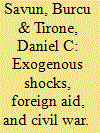

|
|
|
|
|
| Publication |
2012.
|
| Summary/Abstract |
The recent civil war literature suggests that negative economic shocks in low-income countries increase the risk of civil war. Foreign aid can be an effective conflict-prevention tool in times of severe economic conditions. Aid cushions government spending from the downward pressures of economic shocks, providing recipient governments with resources they can use to make rebellion a less attractive option for aggrieved domestic groups. Using Official Development Assistance (ODA) data covering 1990 through 2004, we find that foreign aid appears to be a useful tool for preventing civil wars in the wake of negative economic shocks, and as such aid should be assessed by donors with these conflict-suppressing aspects in mind.
|
|
|
|
|
|
|
|
|
|
|
|
|
|
|
|
| 3 |
ID:
161593
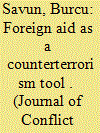

|
|
|
|
|
| Summary/Abstract |
Is foreign aid effective in reducing terrorism? The existing evidence is mostly negative. We argue that this pessimistic outlook on the efficacy of aid as a counterterrorism tool is partly a function of focusing on only one type of aid: economic aid. Governance and civil society aid can dampen the participation in and support for terrorism by altering the political conditions of a country. We expect countries that receive high levels of governance and civil society aid to experience fewer domestic terrorist incidents than countries that receive little or none. Using a sample of aid eligible countries for the period from 1997 to 2010, we find that governance and civil society aid is effective in dampening domestic terrorism, but this effect is only present if the recipient country is not experiencing a civil conflict. Our findings provide support for the continued use of democracy aid as a counterterrorism tool.
|
|
|
|
|
|
|
|
|
|
|
|
|
|
|
|
| 4 |
ID:
091030
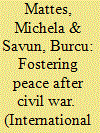

|
|
|
|
|
| Publication |
2009.
|
| Summary/Abstract |
Lasting peace after civil war is difficult to establish. One promising way to ensure durable peace is by carefully designing civil war settlements. We use a single theoretical model to integrate existing work on civil war agreement design and to identify additional agreement provisions that should be particularly successful at bringing about enduring peace. We make use of the bargaining model of war which points to commitment problems as a central explanation for civil war. We argue that two types of provisions should mitigate commitment problems: fear-reducing and cost-increasing provisions. Fear-reducing provisions such as third-party guarantees and power-sharing alleviate the belligerents' concerns about opportunism by the other side. Provisions such as the separation of forces make the resumption of hostilities undesirable by increasing the costs of further fighting. Using newly expanded data on civil war agreements between 1945 and 2005, we demonstrate that cost-increasing provisions indeed reduce the chance of civil war recurrence. We also identify political power-sharing as the most promising fear-reducing provision.
|
|
|
|
|
|
|
|
|
|
|
|
|
|
|
|
| 5 |
ID:
164557
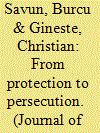

|
|
|
|
|
| Summary/Abstract |
The security consequences associated with refugee flows are among the most widely studied aspects of forced migration. While the majority of this research program has focused on how refugee movements affect the risk of political violence, scant scholarly attention has been paid to violence perpetrated against refugees. Building upon the state repression literature, we argue that refugees are particularly vulnerable to the violation of their physical integrity rights in the wake of terrorist attacks in host states. Governments are pressured to respond to security crises but prefer to take actions without jeopardizing public support. In this context, refugee groups can be strategically attractive targets of repression because they lack electoral power and citizens are often supportive of government crackdown against foreigners in times of security crises. Given that leaders have stronger incentives to respond to voters’ demands quickly in democracies, we expect the effect of terror attacks on violence against refugees to be stronger in democratic host states. Using a novel global dataset on anti-refugee violence between 1996 and 2015, we show that refugees are more likely to be exposed to violence by the coercive agents of the state in the wake of security crises. We provide suggestive evidence that the repression of refugees is more consistent with a scapegoating mechanism than the actual ties and involvement of refugees in terrorism. The findings reveal that the well-being of uprooted populations is particularly at risk when host countries face a security threat.
|
|
|
|
|
|
|
|
|
|
|
|
|
|
|
|
| 6 |
ID:
082056
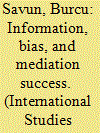

|
|
|
|
|
| Publication |
2008.
|
| Summary/Abstract |
Why do some mediation episodes produce successful negotiated settlements between the disputants of international conflict while others fail to achieve success? This article examines how certain characteristics of a mediator, that is, a mediator's information about the disputants and a mediator's bias toward them, affect the success of mediation of international conflicts. By drawing a conceptual distinction between absolute and relative bias and measuring the type of information that is relevant for mediation success, I demonstrate that both the degree of bias a mediator holds toward the disputants and the degree of information a mediator has about the disputants are significant predictors of mediation success
|
|
|
|
|
|
|
|
|
|
|
|
|
|
|
|
| 7 |
ID:
164560
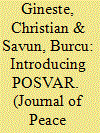

|
|
|
|
|
| Summary/Abstract |
While scholars have for some time debated the role of refugee flows in the international spread of conflict, most evidence has been indirect due to the scarcity of systematic data on refugee-related violence. The Political and Societal Violence By And Against Refugees (POSVAR) dataset addresses this lacuna by providing cross-national, time-series data on refugees’ involvement in acts of physical violence in their host state, either as the victims or the perpetrators of violence, individually or collectively, in all countries between 1996 and 2015. In this article, we provide an overview of the main features of the dataset, identify its limitations, and trace variation in reported levels of refugee-related violence over time and across different types of actors. We emphasize that the data may be helpful to both researchers and policymakers for more accurate understanding of the prevalence of refugee-related violence and the design of more optimal policies to mitigate it.
|
|
|
|
|
|
|
|
|
|
|
|
|
|
|
|
| 8 |
ID:
148476
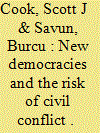

|
|
|
|
|
| Summary/Abstract |
Existing theories of regime transitions suggest that new democracies are more prone to political violence than consolidated democracies. We contend that this risk varies based on the political legacy of the new regime. Specifically, we argue that the prior authoritarian regime influences the risk of conflict in new democracies by shaping the nature of the post-transition political environment. In democracies following military rule, the former autocratic leadership often remains an active political force in the new regime. The continued presence of a materially powerful opposition creates a division in the new regime, increasing the risk of conflict by: (i) complicating efforts to consolidate democratic rule and (ii) signaling potential political opportunity to would-be rebels. In line with our argument, we find that only those new democracies emerging from military rule are more likely to experience civil conflict compared with consolidated democracies. These findings have implications for democracy promotion and conflict prevention efforts, suggesting that democratization is not always associated with an increased short-term risk of conflict as is currently assumed.
|
|
|
|
|
|
|
|
|
|
|
|
|
|
|
|
| 9 |
ID:
164551
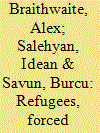

|
|
|
|
|
| Summary/Abstract |
Few issues in international politics have dominated public debates, both in domestic and international arenas, as much as refugee movements across borders in recent years. By the end of 2017, more than 68.5 million people – one in approximately every 110 people on the planet – had been displaced from their homes, either as internally displaced persons (IDPs) or as refugees, due to violent conflict, persecution, famine, or natural disasters. This article introduces a special issue on refugees, forced migration, and conflict. It describes the evolution of the international refugee regime and identifies theoretical and methodological advances in the relevant literature. It concludes with a discussion of the individual contributions to the issue, which seek to address gaps in the literature with respect to explaining motivations for refugee departures, understanding the relationship between refugee populations and political instability in host countries, and tracking public attitudes towards hosting refugee populations.
|
|
|
|
|
|
|
|
|
|
|
|
|
|
|
|
|
|
|
|
|